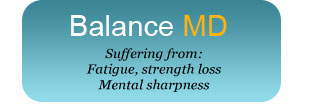Hormone Balance...decreased energy, loss of muscle mass, increased body fat, weaker bones, loss of skin tone, lapses in memory, and diminished sexual drive and activity. These symptoms of aging become more and more noticeable as the years go on.
What are Hormones?
Hormones are the body’s messengers that transport information from the brain to the glands, from the glands to the cells and from the cells to the brain. Hormones rejuvenate, regenerate and restore our bodies. As doctors, we were taught that as we age, our hormones decline. It is now becoming clear that as our hormones decline, we age! Hormones are considered the strongest at from age 25-30 years, the same period when the body is at its strongest and healthiest. Diet and exercise will not be as effective if your hormones are not balanced correctly.
Why Hormones Decline Hormones decline as we age every year after the age of 30. The human body was never designed to live as long as we are living today. Advances in healthcare, vaccinations, sanitation and food preservatives have drastically increased life span. However, the glands that produce our hormones do not regenerate and continue to decline, producing fewer hormones with each passing year. As we age, it becomes increasingly important for both men and women to keep their hormones balanced to protect against fatigue, mood swings, disease, obesity and to enjoy an overall healthier sense of well being.
Natural Hormones vs. Synthetic Hormones Synthetic hormones, like Provera or Premarin, derived from plant progesterone and animal estrogens, are chemicals that act as toxins in the body. Because they are not natural to the human body, we can not metabolize them properly. We favor using only natural bioidentical hormones. Unlike synthetic hormones, bioidentical hormones or natural hormones are replicas of the body’s own natural hormones. They’re made from soy, yams and other plant extracts, which are changed in a lab to be biologically identical to the same hormones your body makes. For optimal safety and results, Dr. Hester supplements only hormones that are low, evaluates client’s symptoms and retests hormone levels regularly.
Hormones: what they mean and what they do HUMAN GROWTH HORMONE – the growth hormone Decreases body fat Increases muscle mass Improves tissue healing and protein synthesis Increases bone density Quicker illness recovery Increases capacity to exercise Increases skin hydration and elasticity Improves sense of well being Decreases incidence of illness
TESTOSTERONE – the male hormone Improves brain function Increases energy Increases strength Increases bone density Increases libido Improves sexual sensitivity Improves sexual function Improves HDL and LDL levels Improves cardiovascular health
DHEA – the mother of hormones Improves neurological function Increases sense of well being Improves immune function Improves stress tolerance Increases metabolism
ESTROGENS – the female hormone Protects against heart disease, stroke Decreases cholesterol Lowers incidence of Alzheimer’s Improves memory Alleviates symptoms of menopause: headaches, mood swings, bloating, hot flashes, fatigue, waning libido
PROGESTERONE – the hormone of pregnancy Protects against breast and uterine cancer Protects against fibrocystic disease Helps fat metabolism Helps normalize blood sugar Helps reverse osteoporosis Helps thyroid hormone function Acts as a natural antidepressant Protects against nervousness Protects against anxiety and irritability
PREGNENELONE – the gateway hormone Promotes formation of other hormones Repairs brain and nerve tissue Enhances many brain functions Reduces aging skin Improves sense of well being Increases energy and mobility Improves sleep quality Reduces harmful stress effects Reduces aging brain deficiencies
THYROID – the hormone of metabolism INSULIN – the hormone of storage Responsible for getting blood sugar into all cells Increases fat storage Increases risk of diabetes, hypertension and stroke
MELATONIN – the hormone of sleep Responsible for maintaining sleep Helps alleviate “jet-lag” Improves one's mood Improves the immune system (by decreasing cortisol)
CORTISOL – the hormone of stress Responsible for responding to stress Helps protect you against your environment (allergens) Mobilizes energy, improves fatigue Increases your appetite for sugar Decreases bone mass, muscle mass, and slows down your metabolism
-thanks to bodylogic
|
|















